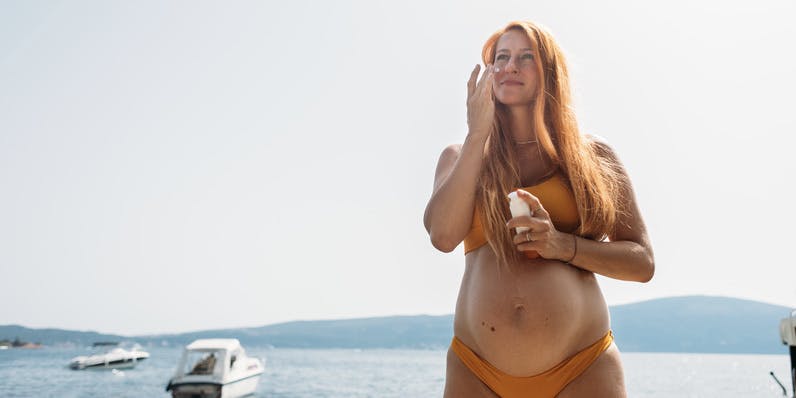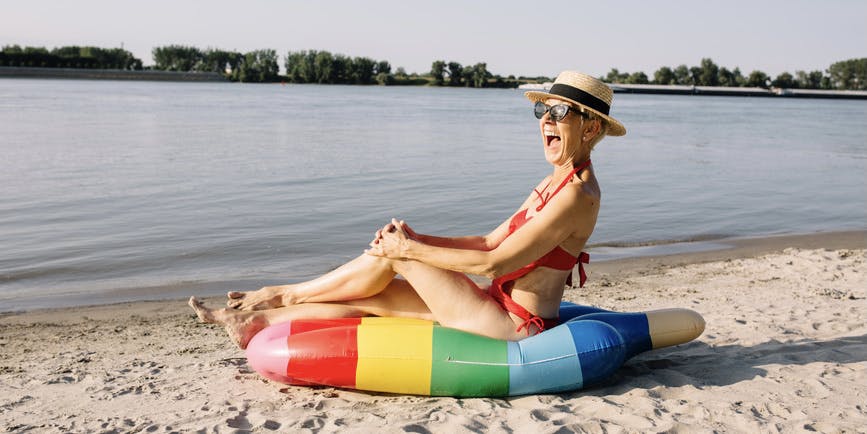
The latest sun and skin care tips for a safe summer

It’s gearing up to be another steamy summer. And while we should wear sunscreen year-round, most of us don’t start reaching for it until Memorial Day hits.
With that unofficial start of summer behind us, it’s time to refresh our skincare routine—and remind ourselves why some tanning habits should remain in the past. So gear up to learn about the 2024 summer skincare tips that'll keep you safely glowing. Then, we’ll close with healthcare updates that include a shocking (in a good way) study on the Mediterranean diet + mortality.
- Checkup: summertime tips
- Sunny Side: sticks + beds + beaches
- Healthcare: bird flu + heat + longevity
The Checkup:
- How to avoid the noise of swimsuit season
- 14 sunscreens perfect for every skin type
- What science says abt timing your AM java
- 30 (delicious) bkfasts w/ 30 grams of protein
- What to do if you have super-sweaty feet
- Do you need sunscreen when inside all day?
- To open up those hips, try yoga’s lizard pose
- How to make the best grilled chix Caesar salad
Do sunscreen sticks work?

If you’ve been contemplating the convenience of sunscreen sticks (or already love them) but question their efficacy, Well+Good got a few dermatologists to break down the details.
Stick + liquid sunscreens rely on the same active ingredients to protect against UV rays. But sticks also include waxes + gels to help them retain their structure.
Sure, that makes sticks less messy to use (since lotions are more likely to spill), as well as more durable for those who sweat + swim a lot. But otherwise, the additives also make us less likely to use them effectively.
Most of us don’t apply enough of sunscreen of any kind. But when using a stick, we can’t pour the recommended amount or see areas of our body that we’ve covered. So we’re more likely to miss spots or apply too little. If we were to feel it out, we’d recognize that we need an uncomfortably thick, waxy layer to get complete protection.
Whichever camp you’re in, learn more about mineral vs. chemical formulations at Time.
Time for tanning beds (again)?

GenXers + older Millenials learned the hard way (cough) that tanning beds are not the best for our health. But according to Harper’s Bazaar, the younger generations want to learn the same from their own mistakes.
In the UK, 42% of 18-25-year-olds have used a sunbed at least once—and only 39% of overall users said they’d potentially stop because of the risks. And the risks are enormous.
Studies using fMRI revealed that tanning activates regions of the brain associated with addiction + reward. That's why those who tan excessively have shown symptoms similar to those with substance disorders, like increased tolerance + withdrawal distress.
Because they emit more UV rays than sunlight alone, tanning beds cause higher rates of skin cancer than cigarettes cause lung cancer. And they can trigger melasma—an overproduction of cells that give skin its color (melanocytes).
To stay safe, get your glow on with these top-rated self-tanners instead.
Beach makeup—yay or nay?

A few weeks ago, we reported that dermatologists want you to lay off the makeup when heading to the gym. When it comes to hitting the beach, their opinions are less severe.
As Glamour sums up, many foundations and moisturizers nowadays include sun protection. But they often don’t contain enough SPF, nor are most waterproof. So it’s a good idea to layer makeup on top of sunscreen for ultimate protection.
Head to the article for product recommendations.
Here’s a general guide to get you started:
- Start with a long-lasting, water-resistant sunscreen with an SPF of at least 50. (Most of us don’t use enough. So the higher the SPF, the better the protection.)
- Next, apply a thin layer of breathable foundation or tinted moisturizer. Go for one that doesn’t clog pores (to avoid breakouts).
- Now, set with powder. Even if you go in the water, it should keep much of the base layers intact. Many also offer light SPF protection.
- Finally, set with spray. For those who don’t want their makeup + SPF to budge, a setting spray will guarantee that no amount of humidity, sweat or spicy food triggers runoff.
Healthcare 411
Third person infected in U.S. bird flu outbreak — but with new symptoms (NBC). A Michigan farmworker in contact with infected dairy cows is the third human to contract bird flu—and the first to have upper respiratory symptoms. This could increase the (low) chance of human-to-human transmission. The CDC is testing samples to determine if the virus has mutated. While no human-to-human transmission has been reported, they expect more human cases to develop, given that 67 herds across nine states have been infected.
Millions in the US face extreme-heat threat as experts urge better protections (Guardian). If you live in Alaska, you’re good. Otherwise, much of the southwest has a high chance of hotter-than-average summer temperatures and the entire northeast + other areas will experience above-average temps from June through August. Outdoor workers are at particular risk, especially those in Florida, Texas and other states that have banned regulations guaranteeing access to life-saving shade + water breaks. The HeatRisk tool can help you anticipate dangerous extremes. For other extreme heat + health tips, review Dr. B’s coverage.
Mediterranean diet helps women live much longer, a large new study finds (CNN). An observational study out of Boston tracking 25,000 women for 25 years found that following a Mediterranean diet reduced the risk of early death by 23%! It specifically cut cancer death risk by 17% and death from cardiovascular disease by 20%. The more committed the woman was to the approach, the better her health outcome! Read the article for significant findings + tips.
Sign up for the free Dr. B newsletter for a weekly report on the latest in healthcare + research-based advice for staying healthy and mentally well.

